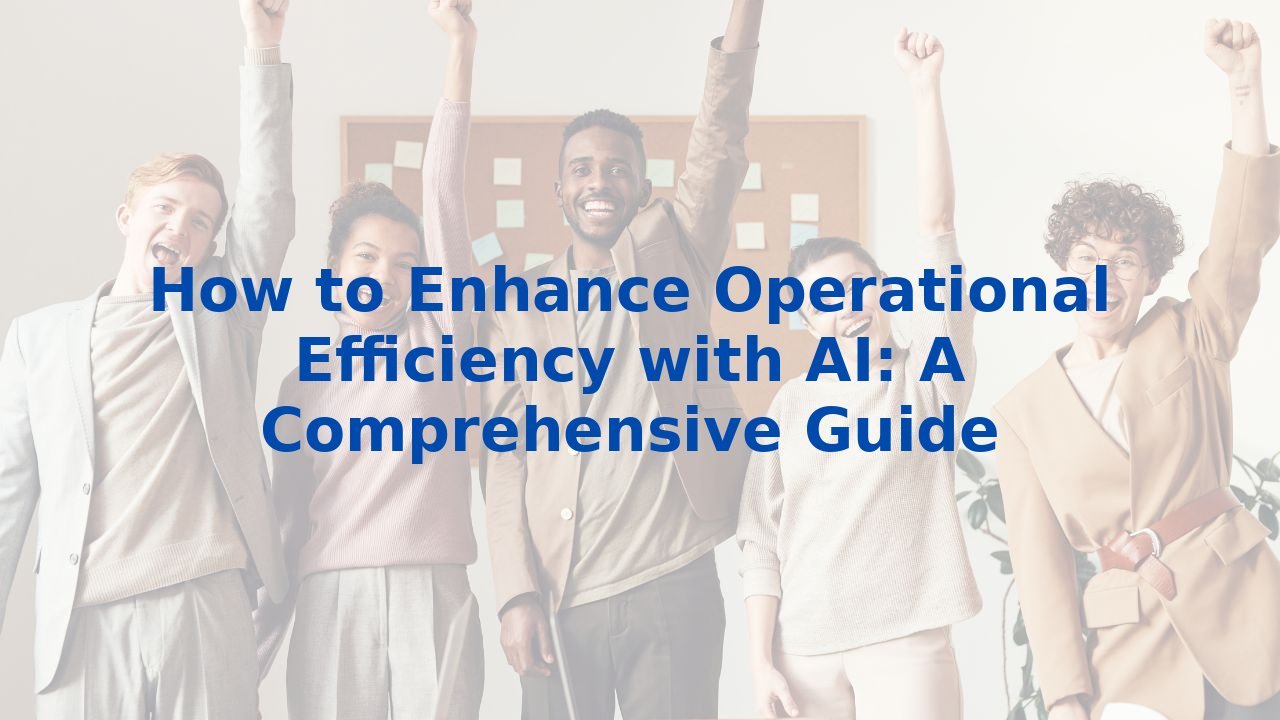How To Enhance Operational Efficiency with AI: A Comprehensive Guide
How To Enhance Operational Efficiency with AI: A Comprehensive Guide
In an era where every second counts, enhancing operational efficiency is more than just a goal; it’s a vital requirement for organizations striving to stay ahead. As businesses embrace the digital transformation, one technology stands out for its ability to streamline workflows and maximize productivity: artificial intelligence (AI). This guide aims to illuminate how AI can enhance operational processes while delivering substantial value to your organization.
Understanding Operational Efficiency
Before diving into AI, let’s first define operational efficiency. Essentially, it is about achieving the highest possible output with the least amount of input, all while minimizing waste. Traditional strategies for operational excellence have included methodologies like Lean, Six Sigma, and Total Quality Management. While these frameworks certainly contribute, integrating AI can supercharge your efforts, making them more precise and impactful.
How AI Enhances Operational Excellence
By harnessing the capabilities of machine learning and automation, AI can elevate operational excellence considerably. Here are a few ways this transformative technology contributes:
- Lean Principles: AI is instrumental in identifying inefficiencies and waste. By analyzing massive datasets, AI enables organizations to make data-driven decisions that align perfectly with Lean methodologies.
- Six Sigma: With algorithms specifically designed to detect anomalies and patterns, AI enhances the quality control processes and supports defect removal, propelling your Six Sigma efforts.
- Business Process Management: AI excels in task automation and predictive analytics, optimizing processes and enabling adaptable management strategies to boost BPM initiatives.
- Total Quality Management: By analyzing customer feedback alongside performance data, AI unlocks insights that enable the continuous refinement of your processes and offerings.
- Continuous Improvement: The real-time monitoring capabilities of AI continuously analyze operational data, fostering a culture of perpetual improvement.
Practical Functions of AI in Business Processes
The deployment of AI across diverse business functions is rising, with operations and customer service leading the charge. Here are practical applications where AI shines:
- Intelligent Automation: Combining AI with process mining creates intelligent systems that autonomously manage decisions. For instance, logistics companies utilize AI to predict cash flows based on customer behaviors, thereby optimizing financial management.
- Process Mining: AI algorithms can sift through event logs, extracting actionable insights about organizational processes. This illuminates bottlenecks and inefficiencies, enabling more informed decision-making.
- Process Optimization: AI analyzes process data to identify improvement opportunities, ensuring the automation of repetitive tasks and the elimination of errors, fundamentally streamlining operations.
Benefits of AI in Business Process Management
The integration of AI into business process management offers a treasure trove of benefits:
- Rapid Data Analysis: AI accelerates the organization and analysis of vast datasets, fostering smarter tactical and strategic decisions without the long hours traditionally required.
- Efficient Process Building: AI can construct efficient processes based on historical data and set parameters, minimizing the time and effort required to map them manually.
- Task Automation: By automating previously manual tasks such as data entry and customer inquiries, organizations can free their human employees to concentrate on strategic priorities.
The Role of AI in Process Management
AI's role in process management revolves around fundamental elements such as process discovery, mapping, and automation:
- Process Discovery: AI leverages process mining and pattern recognition to reveal existing processes and highlight inefficiencies.
- Process Mapping: Visualizing workflows through AI-generated maps ensures documentation remains accurate and accessible, allowing for quick identification of bottlenecks.
- Process Automation: Advanced automation tools powered by AI, such as robotic process automation (RPA), perform repetitive tasks reliably, enhancing efficiency and relieving human resources for strategic activities.
- Continuous Improvement: AI-driven analytics provide valuable feedback, recommendations, and performance insights, promoting a cycle of iterative process enhancement.
Training Employees for AI
While AI is a revolutionary force, its effectiveness is magnified by the human touch. Training employees to effectively leverage AI technologies is equally vital. Here are some compelling advantages:
- Informed Decision-Making: Properly educated employees can interpret AI-generated insights more accurately, empowering better decision-making.
- Adaptability: Employees equipped with AI knowledge can transition more smoothly to new tech and processes, enhancing overall operational fluidity.
- Focus on Higher-Value Tasks: With routine tasks automated, employees are liberated to engage in strategic activities, fostering creativity and innovation.
- Competitive Differentiation: Organizations with AI-literate workers are poised to capitalize on the competitive advantages that AI offers, ultimately driving sustained growth.
Conclusion
In conclusion, AI serves as a game-changer in the quest for operational efficiency, transforming how businesses manage their processes. From data analysis and process building to task automation, the benefits of incorporating AI are extensive. Furthermore, investing in employee training paves the way for realizing the full potential of AI, positioning organizations for a competitive edge in the rapidly evolving business landscape. Now is the time to embrace AI and propel your operational efficiency to new heights.



